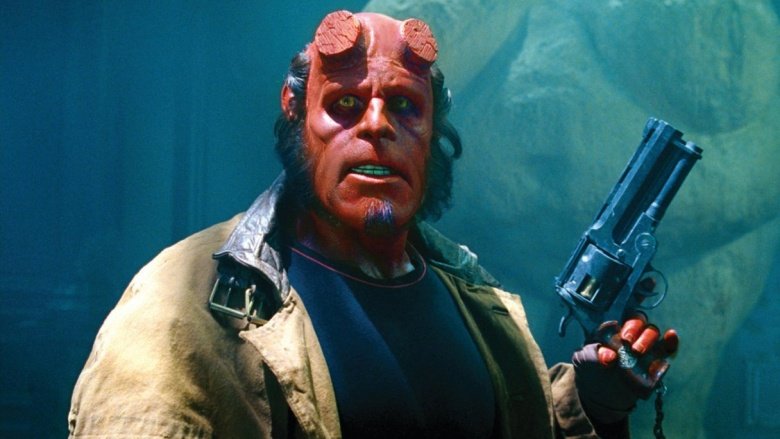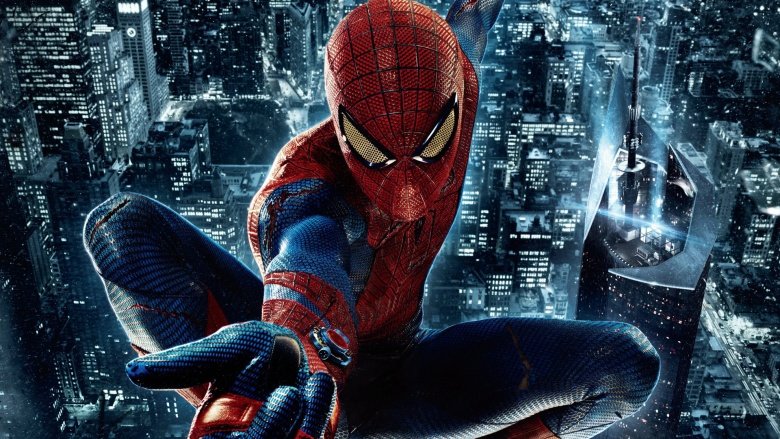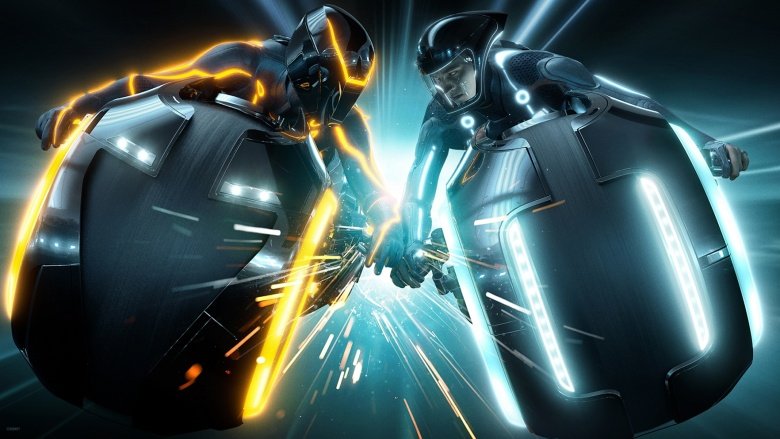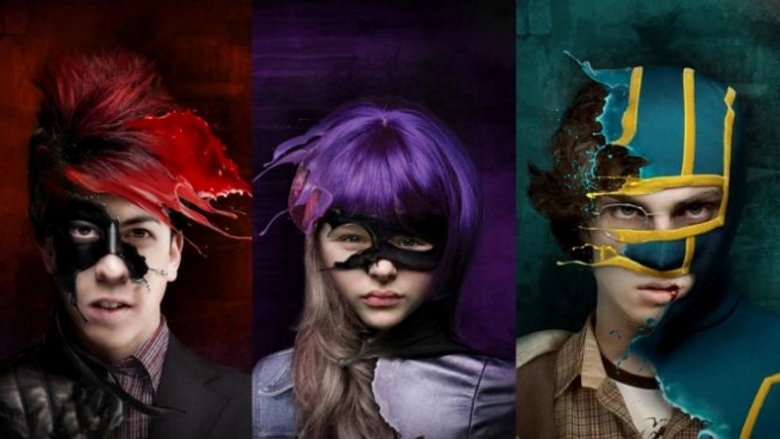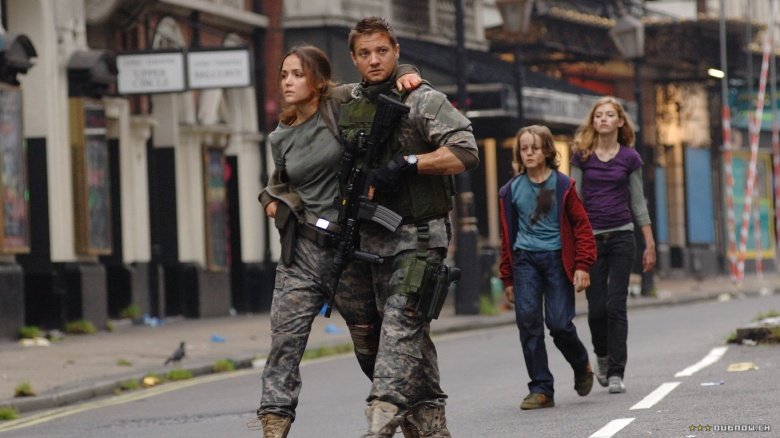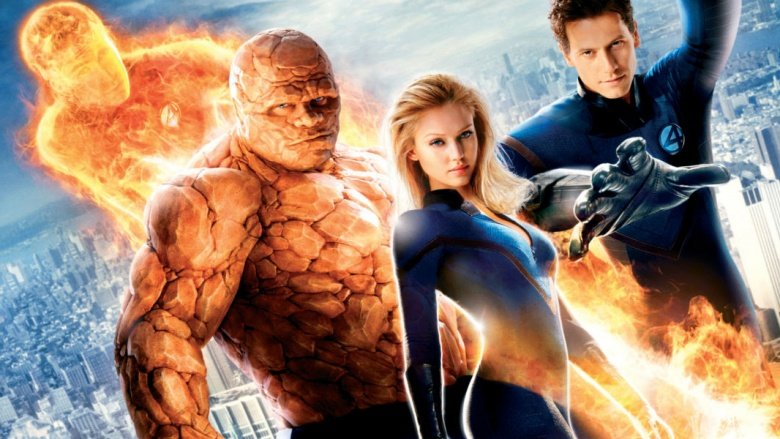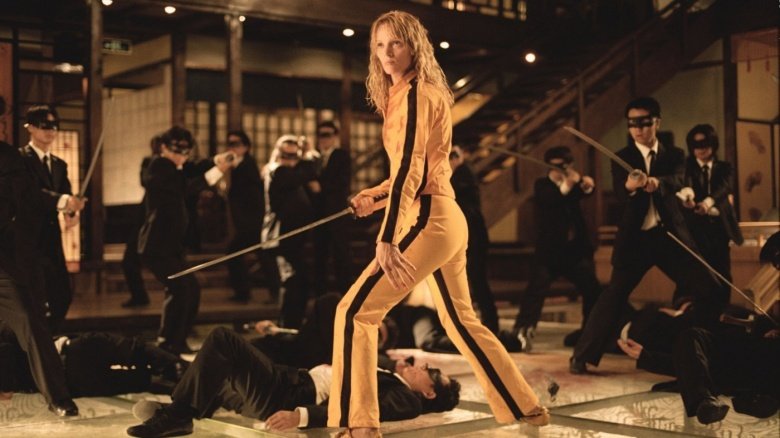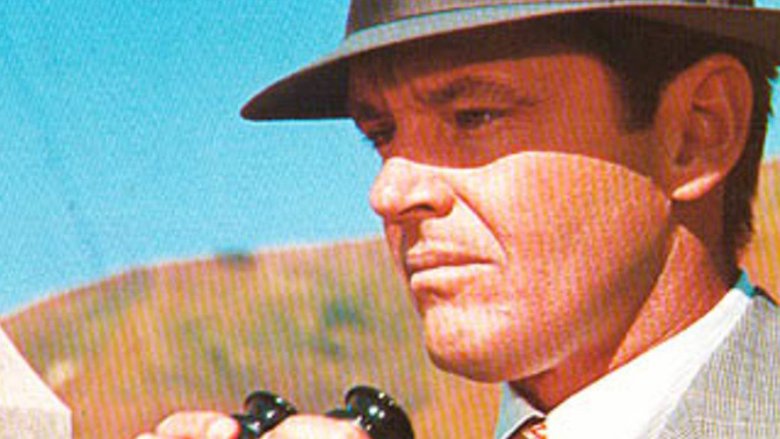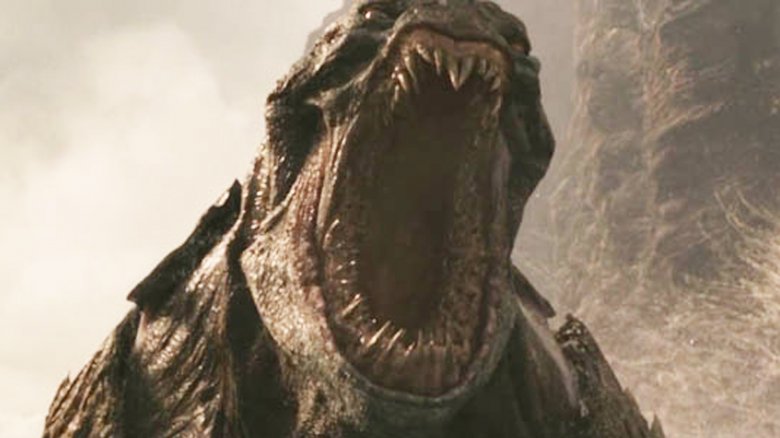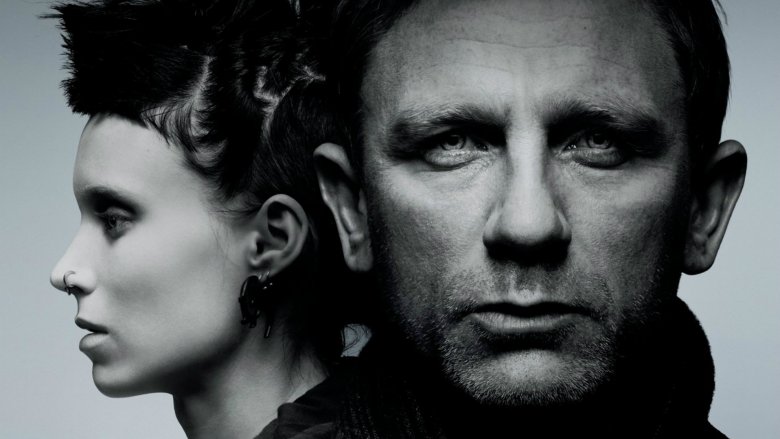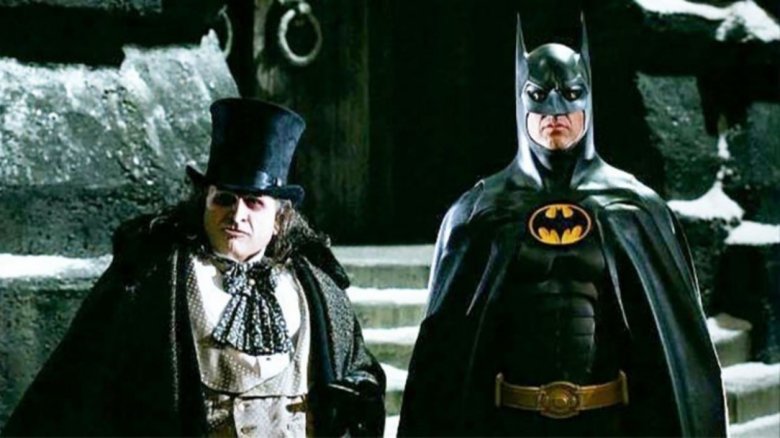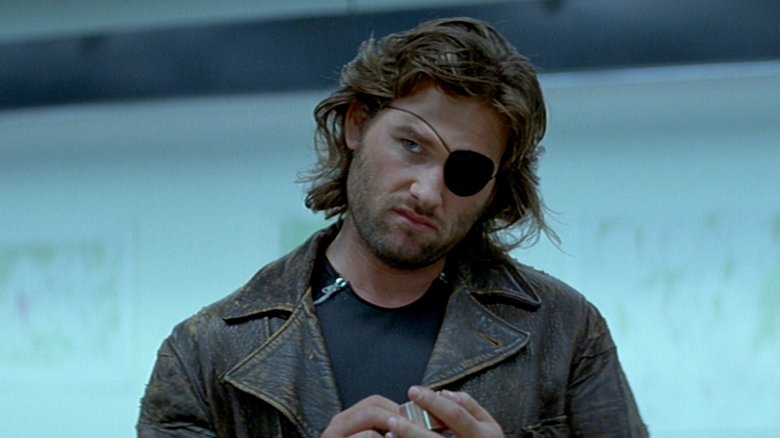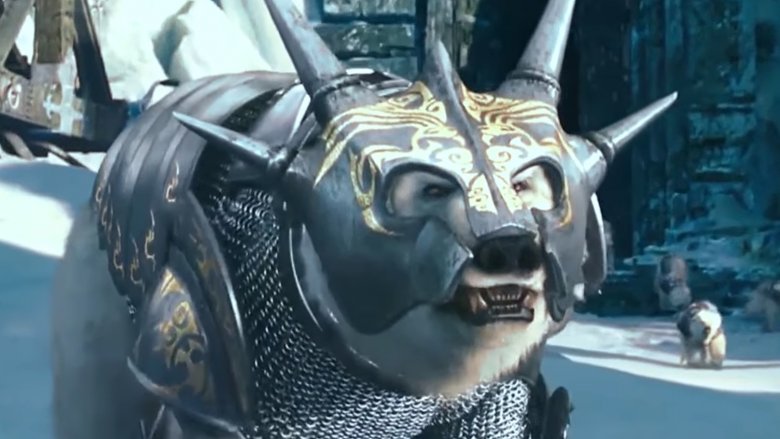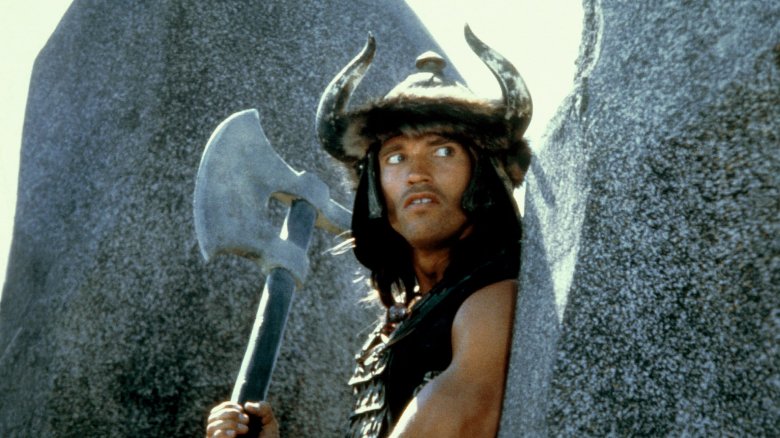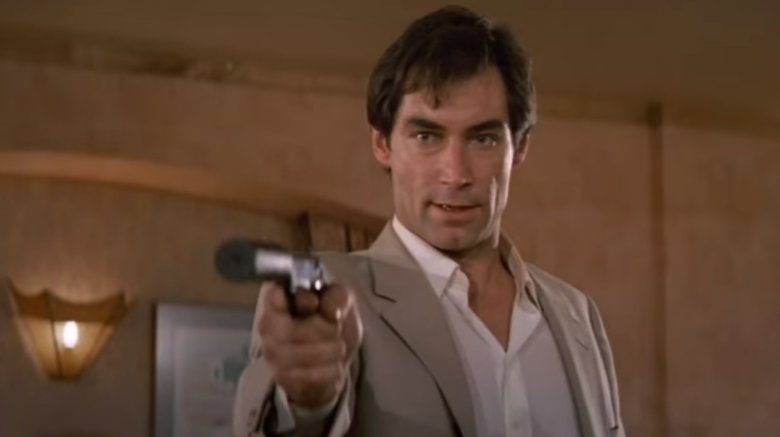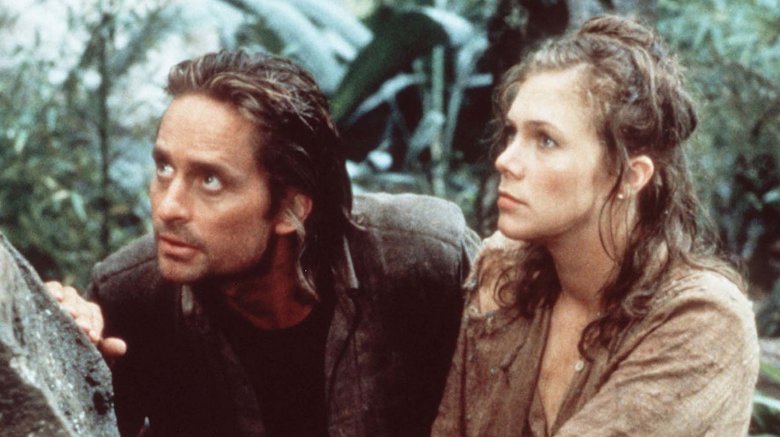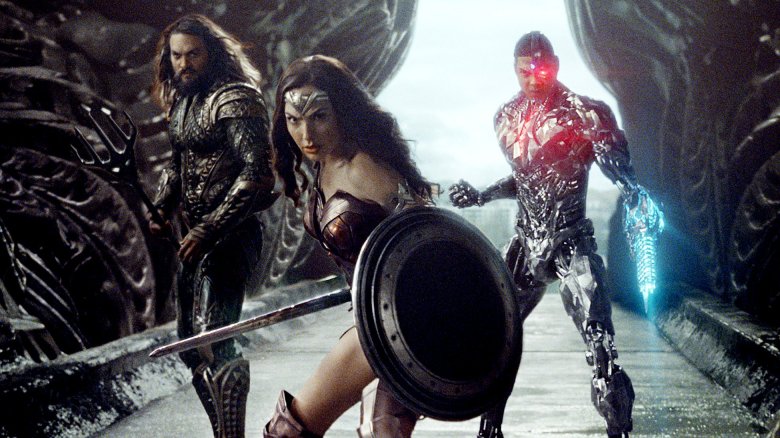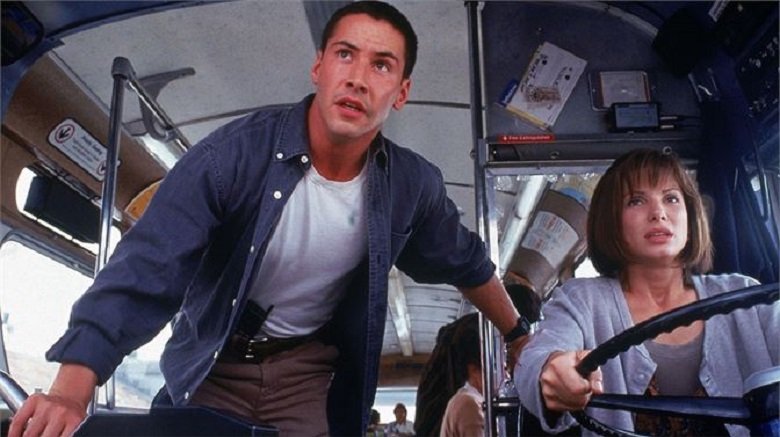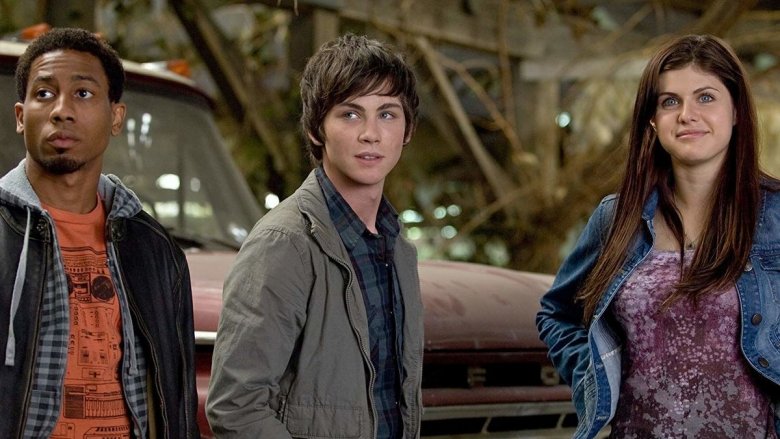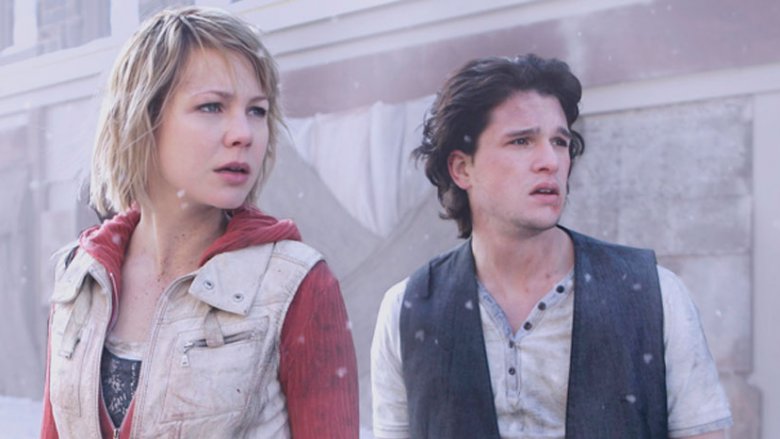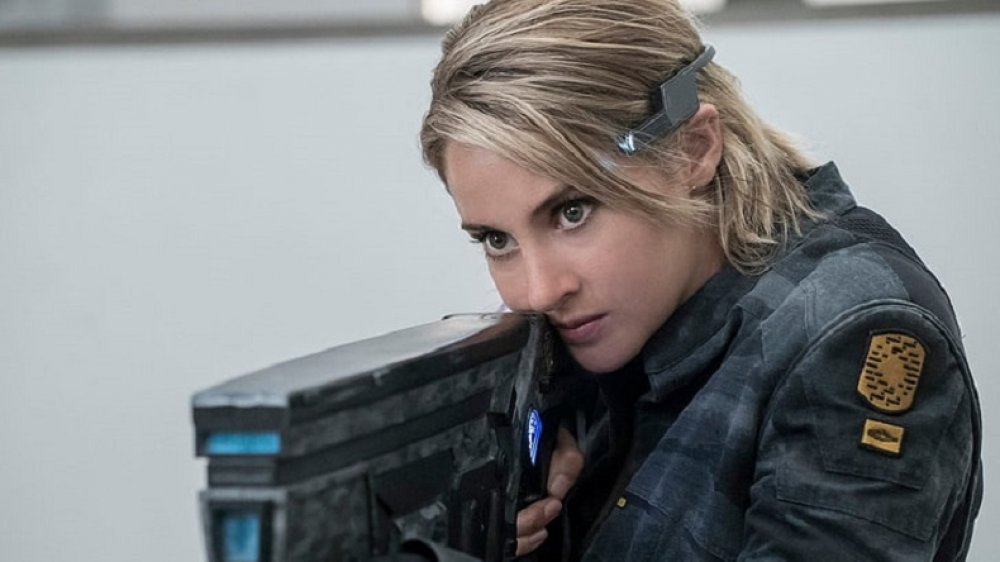Trilogies That Will Sadly Never Get Finished
It seems like just about every new movie is looking to be turned into a franchise or a trilogy these days. While it makes sense for some movies (like superhero stories) to receive multiple sequels and be part of a shared universe, it doesn't always need to happen. (If you saw The Hangover, you get the idea. If you saw any of the sequels to The Hangover, you're jumping from your seat and shouting, "Preach!") Of course, sometimes movies just aren't commercially successful enough for a studio to greenlight a sequel, even if the sequel was going to be really awesome and even if it does leave the previous movie on a totally unacceptable cliffhanger. But people vote with their wallets, so there are plenty of studios with planned sequels that never saw the light of day. Here are some of the movies that will never see their trilogies completed, no matter how much you beg.
Hellboy
If there's an unmade sequel out there that fans truly want to see, it's Hellboy III. Guillermo del Toro's Hellboy II: The Golden Army was released in July 2008, starring Ron Perlman as the eponymous hero. It received overwhelmingly positive reviews from critics and grossed over $160 million worldwide on an estimated $85 million production budget. Although the movie was a modest success for del Toro, it wasn't a monster hit. So Universal Pictures never commissioned a third installment.
Two years after Hellboy II released, del Toro told Rotten Tomatoes he was interested in potentially making another Hellboy movie after his aborted take on The Hobbit. Two years later, Perlman donned his Hellboy costume (full makeup and all) to visit a terminally ill child. That bit of kindness inspired del Toro to push for another film, telling Entertainment Weekly: "I can say publicly that now we are together in trying [to do Hellboy III]."
But years passed and nothing ever happened. Perlman said if Hellboy III were to happen, it would need to be twice as big as the previous two installments, which del Toro said would cost around $120 million to produce. Unfortunately, no studio is willing to put up that kind of money for a franchise that likely wouldn't crack $500 million. Still, del Toro is optimistic that if Pacific Rim 2 is successful, Legendary Pictures might finance Hellboy III. Perlman isn't so confident, and said there's little chance of Hellboy III happening.
Hope sprang eternal in January 2017 when del Toro polled Twitter users on whether they wanted Hellboy III, then had a couple meetings about it when everyone polled said "yes please." But by February, it was all over. Del Toro tweeted that he'd asked everyone and "100% the sequel will not happen. And that is to be the final thing about it."
Amazing Spider-Man
Despite critics and audiences largely detesting Sam Raimi's Spider-Man 3, Tobey Maguire at least got the chance to conclude his Spider-Man trilogy. That's something Andrew Garfield will never get to do, because in 2015 Sony Pictures suspended plans to expand the Amazing Spider-Man franchise and instead opted to share the character with Marvel Studios. As a result, we now have a new Spider-Man (Tom Holland) in the Marvel Cinematic Universe and a rebooted Spider-Man film series. That one officially kicks off with Jon Watts' Spider-Man: Homecoming in 2017. But what were Sony's original plans?
Prior to Marc Webb's The Amazing Spider-Man 2 in 2014, Sony planned to launch an extended Spider-Man franchise to compete with the Marvel Cinematic Universe. It was going to include two more Amazing Spider-Man films (releasing in June 2016 and May 2018), as well as spinoffs for Venom and the Sinister Six, directed by Alex Kurtzman and Drew Goddard, respectively. Sony also hired Lisa Joy Nolan to write a script for a female superhero movie set in their Spider-Man universe, but nothing has since come of it.
Although the studio canceled plans to pursue more Amazing Spider-Man films, they have not shuttered all the Spider-Man spinoff films. In March 2016, Sony confirmed it was moving forward with the Venom film, with Dante Harper penning the script and Avi Arad and Matt Tolmach producing. However, there don't appear to be plans to have the movie connect to either the Amazing Spider-Man films or the Marvel Cinematic Universe.
Tron
It took almost 30 years, but Disney finally released a sequel to Steven Lisberger's cult hit Tron. Joseph Kosinski's Tron: Legacy, starring Garrett Hedlund, Olivia Wilde, Jeff Bridges and Bruce Boxleitner, released in 2010 to average critic reviews. And though the movie became a modest box office success, earning over $400 million worldwide on an estimated $170 million production budget, it wasn't enough for Disney to justify a third installment.
But the thing is, Tron: Legacy writers Edward Kitsis and Adam Horowitz had already begun working on a script for a third film before Legacy even released. Not long after Legacy hit, Ain't It Cool News reported that Disney was gearing up to announce Tron 3 — but the announcement never arrived. Instead, years and years of updates, promises, and delays ensued, with a new writer being brought on board due to Horowitz and Kitsis leaving to work on their ABC fantasy series Once Upon a Time.
Things were finally starting to look up when rumors swirled that production might ramp up in October 2015. Unfortunately, Disney decided not to move forward with Tron 3, which Wilde confirmed. Boxleitner soon expressed disinterest in continuing the franchise, too, after going through several production ups and downs. With Star Wars, Marvel, and countless fairy tale remakes, Boxleitner feels Disney is "going to play it safe with their old [formula]." Still, Hedlund believes there's a glimmer of hope. He told ComicBook.com: "I haven't been told it's totally dead," which admittedly isn't the strongest vote of confidence. But, he did suggest possibly continuing the series 30 years later, like Legacy did. While rumors swirl of Tron 3 eventually becoming a thing — produced by Justin Springer and possibly starring Jared Leto — we currently have naught but memories of the first two. Oh, and Kingdom Hearts II, which centered a whole level around Tron. It's a start.
Kick-Ass
Disney and Warner Bros. may control the majority of major comic book properties via Marvel and DC Comics, but that doesn't mean people should count out other studios. Universal Pictures has made several attempts at producing non-Marvel and non-DC Comics movies, such as the aforementioned Hellboy series. Another successful attempt to break from the Big Two? Kick-Ass, based on the indie comic series of the same name by Mark Millar.
Director Matthew Vaughn brought Kick-Ass to life on the big screen in 2008, with Aaron Taylor-Johnson starring as the eponymous costumed hero. Praised for its adult themes, Kick-Ass received positive reviews from critics and managed to become a modest box office success, prompting Universal to move forward with a sequel. Directed by Jeff Wadlow, Kick-Ass 2 released in August 2013 to negative reviews. Although the film was a decent commercial success, it failed to perform as well as the first film.
Shortly before the release of Kick-Ass 2, Millar confirmed plans for a third movie that would largely depend upon how much money the second movie made. Later that month, Millar reiterated plans for a third installment and even went further, saying Kick-Ass 3 would conclude the Kick-Ass trilogy with a major death. In 2014, Taylor-Johnson, Mintz-Plasse, and Moretz all expressed interest in Kick-Ass 3, despite the fact that none of them were actually contracted for a third film. However, instead of immediately pursuing a sequel, Vaughn said in 2015 that he'd like to make a Hit-Girl prequel before tackling Kick-Ass 3. But with Vaughn's busy schedule, who knows if we'll get either movie?
28 Months Later
Five years after Danny Boyle's 28 Days Later released in theaters, the sequel 28 Weeks Later arrived. Directed by Juan Carlos Fresnadillo, 28 Weeks Later depicts a NATO takeover of the U.K., where they supposedly quelled a zombie infestation. Unfortunately, one person infected with the virus survived and manages to spread it to the remaining survivors. At the end of the movie, a handful of survivors escape England and make it to France. However, one of them was still a carrier for the infection, and the movie's cliffhanger showed zombies running rampant in front of the Eiffel Tower, thus indicating the infection had spread across the channel.
Shortly after 28 Weeks Later released, Boyle indicated plans for a third installment were in the works. Unfortunately, screenwriter Alex Garland believed the rumored 28 Months Later movie wouldn't happen due to copyright issues: "When we made 28 Days Later, the rights were frozen between a group of people who are no longer talking to each other."
Boyle still wants to make a third movie, and he even has some ideas for what it would entail. He has declined to share any of his ideas because he worries, albeit jokingly, they might end up in an episode of The Walking Dead. But, Boyle and Garland are both up for making 28 Months Later — there are just several complications holding them back from moving forward. Still, they have hope.
Fantastic Four
After achieving global success with Bryan Singer's X-Men series, 20th Century Fox hoped to build off those movies' hype by moving forward with a Fantastic Four series. The first Fantastic Four movie, starring Ioan Gruffudd, Jessica Alba, Chris Evans, and Michael Chiklis as the titular heroes, released in 2005 to mixed reviews. However, fan anticipation led the Fantastic Four to become a box office success, earning over three times its production budget.
Fantastic Four's success inevitably led Fox to commission a sequel, titled Fantastic Four: Rise of the Silver Surfer. Director Tim Story and the rest of the cast and crew all returned for the 2007 follow-up. Despite being critically better than the first film, Rise of the Silver Surfer still received mixed to negative reviews and even performed slightly worse at the worldwide box office, taking in $289 million on an estimated $130 million production budget. Those mediocre box office results initially made Fox hesitant about immediately pursuing a sequel.
However, there was hope. All five of the main cast members, including Julian McMahon (aka Doctor Doom), were signed on for three-picture deals. They were also interested in making another movie and diving deeper into the Fantastic Four mythos by introducing new characters, such as Franklin Richards. Although Story was keen to make a third and fourth film, Fox was having none of it. Evans put an end to fans' hopes in 2008 saying the franchise is "a closed book." And he was right. Instead, Fox attempted to reboot the Fantastic Four in 2015 with Josh Trank at the helm — a film so bad it might've finally iced the franchise for good.
Kill Bill
Quentin Tarantino has a unique approach to filmmaking, which is evident in his films like Reservoir Dogs, The Hateful Eight, and of course, the Kill Bill series. He is also a director who likes to make one story at a time, moving from one project to another without sequelizing. However, just a few short months prior to Kill Bill releasing in theaters, Tarantino and Miramax concluded that the four-hour film would have to be split into two releases. Thus Kill Bill: Volume 1 and Kill Bill: Volume 2 were born.
Although they aren't his most commercially successful films, the two-part grindhouse homage has become a cult hit in the years since its release. The second film ends on a solid note, with Bill dying and Beatrix and B.B. leaving together. However, Tarantino believes there is always room for more. In 2004, he indicated plans to make a Volume 3 with Uma Thurman reprising her role as Beatrix Kiddo. But Tarantino said he would probably wait around 15 years before making another one.
Tarantino said he planned on making another installment (and maybe even a fourth one), with the story potentially focusing on "the revenge of two killers whose arms and eye were hacked by Uma Thurman in the first stories," or a daughter's revenge story. But nothing ever came of either idea. In 2012, Tarantino finally conceded it probably wouldn't happen. And in February 2018, Thurman called Tarantino out for making her drive a car too fast while filming Vol. 2, ultimately crashing and injuring herself. Don't expect them to be working together anytime soon.
Chinatown
Not many people know that Roman Polanski's 1974 masterpiece Chinatown already has a sequel. In 1990, Jack Nicholson reprised the role of grizzled PI Jake Gittes in The Two Jakes, a sequel that is to its predecessor what Godfather III is to The Godfather. But had The Two Jakes set the box office alight, it would've paved the way for a full-on trilogy.
Polanski's original turned the detective movie on its head with its story of evil, rich men being shielded by a rotten system, even as they exploited a vital resource (water) and destroyed the lives of those they loved. The Two Jakes chose not to flip the formula back and featured yet more evil, rich men exploiting natural resources (oil) while destroying loved ones' lives. While not directed by Polanski (Nicholson took over as director, for obvious reasons), it was still high-profile enough for writer Robert Towne to envisage yet another tale of evil men exploiting resources and messing up family members' lives. Hey, if it ain't broke.
Gittes vs. Gittes would've seen Nicholson's detective take on a monopoly controlling access to the L.A. freeway while also going through a messy divorce — the other "Gittes" of the title. Unfortunately, The Two Jakes bombed so hard that Towne gave up on the idea of Part 3 altogether. Not that Chinatown 3's story ended there. A competing treatment commissioned by the studio wound up being reused as the basis of another L.A. noir film, 1988's Who Framed Roger Rabbit?
Clash of the Titans
The tagline for 2010's remake of Clash of the Titans was "Titans will clash," which does an excellent job of summing up both the plot of the movie and exactly what the filmmakers thought of their audience. (Not much.) Despite this, the film wound up being kinda fun, in a dumb, goofy sorta way. Good box office and not-as-awful-as-expected reviews (from Roger Ebert, no less) evidently led the producers to think they had a series on their hands because a sequel was immediately announced, and then a third part announced before that sequel was even released (via Hollywood Reporter). It seemed Titans would be clashing forever, or at least they could have been, had the sequel not sucked reproductive organs.
2012's Wrath of the Titans was everything the original seemed like it was going to be: a garish explosion-fest that was as emotionally satisfying as cholera. More to the point, it underperformed at the box office, pulling in only $83 million domestically, about half what the original managed. Despite having been announced back in 2011, the final part of the trilogy was put on indefinite hold. In very little time at all, "indefinite hold" became industry speak for "canceled."
By 2013, even the producer, Basil Iwanyk, was saying he couldn't see Titans 3 happening without fresh ideas (via IGN). If you're still looking, Mr. Iwanyk, how about a movie where Titans resolutely refuse to clash? Now that would be a twist.
David Fincher's Millennium trilogy
On paper, the Millennium trilogy must have looked like the surest bet in Hollywood. Based on the mega-selling books by Stieg Larsson? Check. Directed by David Fincher, the genre-hopping talent behind Fight Club and Se7en? Check. Shirtless Daniel Craig? Double check. To paraphrase Philip J. Fry, shut up and take our money!
The first Millennium movie, 2011's The Girl with the Dragon Tattoo, managed to pull in $223 million off a $90 million budget, enough to prompt talk of a sequel. There were still two books left unfilmed, and a Fincher/Craig Girl Who Played with Fire and Girl Who Kicked the Hornet's Nest would be sure to generate a tidy profit. Since the original books function as a trilogy, it made sense for the films to do the same. Well, it would have made sense if the movies were fronted by a cheaper lead actor.
Sony claims Craig wanted too much money to reprise the role of Mikael Blomkvist for two more films. At one point, they considered completing the trilogy with a different lead. Then they ditched Fincher, too, and talk of a trilogy went out the window. Latest reports say Sony was planning a 2018 reboot with a new cast, adapting the semi-official fourth Millennium book, written after Larsson's death without consent of his partner and without referring to Larsson's own unfinished draft or notes. It may turn out to be popular, but it sure as heck won't be a continuation.
Tim Burton's Batman Forever
If the turnaround on some superhero franchises seems fast now (ahem, Spider-Man), spare a thought for audiences in the 1990s. After Bat-breaking box office records with 1989's Batman, director Tim Burton and star Michael Keaton returned three years later with Batman Returns, a movie that hinted at more Bat-adventures to come. In 1995, those adventures dutifully arrived, only now they were a neon-drenched Bat-debacle fronted by Val Kilmer, directed by Joel Schumacher, and featuring Jim Carrey as an ordinary actor bitten by a radioactive slice of ham. What happened?
Simple. As with Chinatown, Burton's trilogy was completely sunk by its underperforming middle part. Batman Returns received negative reviews by the bucketload. While it did OK at the box office, it also got lambasted for promoting violence, damaging McDonald's Happy Meal tie-in toy sales. So Warner Bros. dropped Burton, Keaton left, and the final part of the trilogy was replaced by two ridiculously garish Schumacher films.
Burton fans (or Schumacher haters) can still content themselves with the little clues about Part 3 in the existing films. Billy Dee Williams had been all teed up to play Twoface. Marlon Wayans was cast as Robin in Batman Returns but was left on the cutting room floor. Industry rumor suggests Robin Williams was meant to play a manically unhinged Riddler. Would it have been any good? Hey, it couldn't have been worse than Batman and Robin.
Escape from New York
Escape from New York is John Carpenter's gritty, weird 1981 ode to a city he apparently hated, a tale in which New York has become a giant prison and only Kurt Russell is man enough to punch his way in there to save the president. Yeah, it's a B-movie, but what a B-movie! There's action. Watergate parallels. Harry Dean Stanton's hangdog face. You get the idea. By the 1990s, Escape was already a cult classic, and one that was crying out for a sequel. So Carpenter and Russell obliged, twice. They announced two new parts: Escape from LA, and Escape from Earth. Spoiler alert: Only one of those would actually get made.
Geek site The Mary Sue has the full details, but they can be summed up in a single sentence. Escape from LA bombed. It bombed harder than any movie featuring Kurt Russell hang-gliding into Disneyland while firing a machine gun has any right to. The trouble was, LA was beyond wacky. It had Russell chase a car by surfing after it. It had Botox monsters. World-saving basketball games. No Harry Dean Stanton. While some people love it today, '90s audiences treated it like the celluloid itself was made from roadkill.
Nevertheless, Carpenter and Russell tried to get their trilogy's capstone finished. It nearly became a TV series, then an anime movie. Today, though, Escape from Earth is officially dead, with the production company instead reviving Escape from New York as a new trilogy directed by Robert Rodriguez.
His Dark Materials
In the wake of Peter Jackson's Lord of the Rings trilogy and the Harry Potter films, studios were scrambling to find the next big fantasy epic. Narnia, the Avatar books, and more were all bought up, but it was New Line that bagged the winner. His Dark Materials was a grim atheist fantasy by British writer Philip J. Pullman that had set the literary world alight a decade earlier. It had battles. Baddies. School children sprinting through spectacular set pieces. Post-Potter, it seemed a surefire success.
And it might have been had the first film, The Golden Compass, not managed to anger just about everyone. Fans were outraged that New Line tried to water down the books' anti-religion themes, while religious organizations were outraged by the diluted remnants of those same themes. (According to The Guardian, Fox News even claimed it was part of that year's "war on Christmas".) Perhaps it's no surprise the film made barely $70 million at the domestic box office against its $180 million budget.
The global box office was actually pretty solid, adding another $300 million, but the damage had already been done to its reputation. It didn't help that New Line forced the creation of a cliffhanger, gotta-watch-the-sequel ending in an attempt to milk money right out of viewers' pockets. Bad news for anyone still waiting: the poor reviews and bad box office killed this trilogy as dead as the series' own god.
Conan the Barbarian
Conan the Barbarian was the 1982 film that introduced us to Arnie's glistening, oiled pecs, thus beginning a process that would turn the Austrian muscleman into a global star. That's all you need to know to understand the fate of the Conan trilogy, which would have seen 1984's sequel Conan the Destroyer followed in 1987 by a final part. Sadly for fans of Arnold in a loincloth (i.e., everyone), 1984 was also the year a little movie called The Terminator was released. The idea of any B-movie being able to afford Arnie after that was unlikely, to say the least.
But, hey, God works in mysterious ways. Conan 3's script was eventually reworked into 1997's Kull the Conqueror and, as this old review attests, it was one of the most hilariously godawful things ever committed to celluloid. That bullet dodged, Arnie waited a while, did some political stuff in California, then finally revived the idea of a Conan trilogy after leaving the governor's mansion. The plan was to revisit Conan at the end of his life, in a script that took the same approach as Unforgiven did for Clint Eastwood's Man with No Name, and Logan did for Wolverine. Don't worry, that feeling in your pants is perfectly natural.
Sadly, not all producers are able to distinguish between "awesome" and "not awesome" because Conan's final outing was killed off in April 2017 (via Den of Geek). An Arnie-fronted TV spin-off is now heading to Amazon's streaming service instead.
Timothy Dalton's Bond trilogy
There are formal trilogies and there are informal trilogies, like three thematically linked films in a larger series. According to various reports, Timothy Dalton's mooted Bond trilogy would have fallen into the latter camp. Conceived as a way of capping the actor's involvement with the franchise, it would have given Dalton's Bond a big send-off while indulging in the themes that made his previous two outings so distinct.
Known in pre-production as Bond 17, the unfinished picture got as far as the scripting stage. The plot involved deadly accidents at nuclear power stations in the U.K. and China, the work of a British-Chinese megalomaniac determined to use the threat of a catastrophic meltdown to force the British to hand Hong Kong back to China. Needless to say, Bond would have stopped this unthinkable eventuality by breaking into the bad guy's base and blow-torching his face off. If that sounds a little grotesque, it all fits in with the idea of this capping a Dalton trilogy. His previous Bond film, 1989's License to Kill, ended with him setting a dude on fire.
Bond 17 stayed on the table right up until 1994, when Dalton got tired of waiting and quit the role. Bond was recast as Pierce Brosnan, and Bond 17 became Goldeneye. Perhaps it's just as well. Within two years of Goldeneye's release, Hong Kong had been handed back to China with nary a megalomaniac in sight.
Romancing the Stone
In 1984, Robert Zemeckis managed to take a movie Fox had written off and turn it into box office gold. Romancing the Stone was that year's sleeper hit, thanks in no small part to stars Michael Douglas and Kathleen Turner having chemistry explosive enough to power a small fusion reactor. Fox was so impressed it immediately rushed out a sequel, Jewel of the Nile.
Although Nile did good box office, it was hell to make. Den of Geek reports that neither Turner nor Douglas wanted to do the picture, and only agreed after Fox threatened to take them to court for breach of contract. Still, easy money is easy money, and it wasn't long before Douglas announced that a final chapter, The Crimson Eagle, would soon be released. Like, any minute now. Any. Minute. Now...
For a long time, Eagle looked a sure bet. IGN notes Douglas quit his role in 1997's U-571 to focus on it. In 2008, a retitled version called Chasing the Monsoon was reported as preparing to shoot in India, with Catherine Zeta Jones taking over from Kathleen Turner (via Telegraph). It would have been the first proper Hollywood and Bollywood co-production ... had it not also vanished into development hell. By 2011 Monsoon had itself been replaced by a remake, which in turn was replaced by a TV series that also seems to have now dropped off the radar. Just think of all those poor stones that will never know romance.
Zack Snyder's Justice League
In terms of offers you most certainly can refuse, "would you like two more Justice League movies directed by Zack Snyder?" is up there with "would you like to take part in our new reality TV series Sleeping with Porcupines?" After disappointing audiences with Man of Steel in 2013, Snyder went on to really disappoint audiences with Batman v Superman in 2016, before teaming up with Joss Whedon to redefine notions of disappointment with 2017's half-dark, half-goofy, all-flop Justice League, aka the film that ended this iteration of the DCEU.
After three critical maulings, plus worse than expected box office, DC canceled all remaining plans for Snyder-fronted movies. Most people who actually saw Justice League probably picked up that a sequel was on the cards, but a trilogy? Well, according to Kevin Smith's Fatman Beyond podcast, that was exactly what Snyder had planned. The next two movies were gonna throw the DC kitchen sink at the screen and hope that awesomeness followed.
Smith talked to many people involved with the planned trilogy. He claims part two would have introduced the Green Lantern and intergalactic villain Thanos — sorry, Darkseid — who would have defeated the League, arrived on Earth, and killed a significant percentage of its population. (Say, 50 percent?) Part three would have then seen the League regroup and return to Earth, finally defeating Darkseid and probably destroying some magical Minfinity Shmones or something. It sounds kinda cool on paper, but then so did Suicide Squad.
Speed 3
In 1994, a little action movie came out. It was about a bus that had to speed around a city, keeping its speed over 50 mph, and if its speed dropped, it would explode. Yep, The Bus that Couldn't Slow Down (or, to give it its boring, real-life name, Speed) was a sleeper hit, setting the box office alight and proving that Keanu Reeves' three stock facial expressions were absolutely no impediment to him starring in action flicks. Unless, that is, that action flick was Speed 2: Cruise Control, a movie about what would happen if you put a bomb on perhaps the least exciting, least speedy of all vehicles (a cruise ship) and said "action?"
The Keanu-less Speed 2 tanked. Despite a weirdly good review from Roger Ebert, the film today holds a grim 4 percent on Rotten Tomatoes. To put that in perspective, the steaming mess that was 2016's Suicide Squad has 27 percent. Suicide Squad, people!
Now, unlike some of the trilogies we've mentioned, this wasn't originally planned as a trilogy. But despite Speed 2 being so pungent you could serve it as an Icelandic delicacy, it wasn't long before rumors began of Speed 3 began floating around. However, it seems that rumors were all they ever were. Although a treatment made its way onto the internet, the proposed Speed capstone never reached production. The only Speed 3 we have today is one involving Irish priests slowly driving explosive-rigged milk trucks. (Thanks, Father Ted!)
Percy Jackson and the Olympians
The young adult book series Percy Jackson and the Olympians is about what would happen if a teenage boy discovered he had the powers of a demigod. The movie series Percy Jackson is a cautious morality tale about what did happen when a bunch of producers discovered they could make serious money ruining books for everyone. Debuting with an un-awesome 49 percent on Rotten Tomatoes, the first Percy Jackson movie, The Lightning Thief, still did well enough to warrant a sequel, Sea of Monsters. Although that movie dropped to an even less awesome 42 percent, a third part was still greenlit. Hey, at this rate it'd take two whole other movies to get down to Batman vs Superman levels of badness!
Despite the third part seeming like a sure bet, nothing came of The Titan's Curse. As early as 2014, star Logan Lerman was saying he thought it "unlikely" that the series would ever be completed. From the distant future, we can confirm he was right. With Lerman now in his late twenties, his Percy Jackson ship has probably sailed for good.
Still, fear not, fans of Greek myth transplanted to modern America! After Disney acquired most of Fox's properties in 2019, the rights to the Percy Jackson book series carried over to the House of Mouse. With Disney+ looking to make a major streaming splash, what are the odds that we'll soon see this one rebooted as a rollicking TV series?
Silent Hill
In 1999, Konami dropped a little game known as Silent Hill. A survival horror that leaned into both Stephen King and H.P. Lovecraft while being its own unique thing, Silent Hill was mainstream proof that games could be scary. It was atmospheric. Eerie. It used what were then common limitations (everything beyond a certain distance vanishing into an unrendered haze), and made them parts of its creepy world. (The town of Silent Hill is permanently wreathed in mist.) Inevitably, it wasn't long before Hollywood came calling.
2006's Silent Hill took the storyline of the first two games and turned it into a film that, as Roger Ebert attested, managed to both look fantastic and make absolutely no sense. Still, that was enough to earn decent box office returns, and there was soon buzz about future Silent Hill films. At that point — 2006 — there were still three more games ready to be adapted, plus another on the way. Did someone say ... trilogy?
While talk of a trilogy was never official, that hope was in the back of fans' minds when Silent Hill: Revelation finally hit theaters in 2012. Then they actually saw Revelation and got to watch their trilogy dreams die in real time. Silent Hill: Revelation was a mess that not even Kit Harington's feature film debut could save. It was even less coherent than the original, but with none of the fantastic production design. The film was so unremittingly awful that it killed off all talk of another sequel. In 2018, director M.J. Bassett even publicly apologized for it.
Divergent: Ascendant
The 2010s will be remembered as the decade where splitting YA book adaptations into unnecessary two-part films became practically a legal obligation (hey, it's not like anything else happened in that decade. Err, right...?) There was Harry Potter and the Deathly Hallows, Hunger Games: Mockingjay, and Twilight Saga: Breaking Dawn. So when the producers of the Divergent series turned their attention to the third and final book, they unsurprisingly decided to split it in two. Some fans may have grumbled about the delayed conclusion, but at least they'd get their ending in the near-future. Like, Hollywood wasn't gonna just film half the final book and leave the conclusion permanently hanging. Yeah, about that...
According to ScreenRant, the first two Divergent films had done solid but unspectacular box office, and there were signs the appetite for Hunger Games knock-offs was already waning. But in a spectacular demonstration of how money always trumps art in Hollywood, the producers decided to take their chances and split the last movie regardless. Part 1, Allegiant, was released in 2016. It bombed so, so hard.
Allegiant's box office was a mere $180 million against a $110 million budget (via Collider). This was such a fail that plans for the second part, Ascendant were canceled and replaced with a TV movie that most of the original cast refused to take part in. Facing backlash from Divergent's remaining fans and indifference from everyone else, in 2018 the studio canceled even this cruddy consolation prize.
